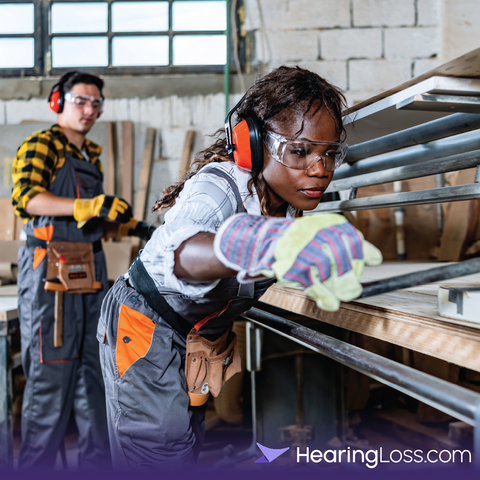Premature hearing loss is not solely caused by noise; however, it plays a significant role. Imagine excessive noise, such as a severe storm—soundwaves, like gale-force winds, that can leave disaster in its wake. Unlike storm damage, however, the impact of soundwaves often remains hidden until it’s too late.
In this article, we will look at how noise affects hearing, as well as some general hearing safety tips for lessening the likelihood of premature noise-induced hearing loss.
How Does Noise Affect Hearing?
Deep within the fluid-filled cochlea of your inner ear lie hundreds of thousands of ultra-sensitive stereocilia. These tiny hair cells transform sound wave vibrations into electrical impulses. When exposed to hazardous noise levels—prolonged exposure of 70dB to 80dB, as some experts say—the powerful sound waves can significantly damage and snap the delicate stereocilia, rendering them unable to transmit signals to the brain. Over time, with repeated exposure to excessive noise levels, the cumulative effect of this damage becomes apparent.
Noise-induced hearing loss, as it’s known, is an unfortunate reality that nearly 40 million U.S. adults aged 20-69 face. Luckily, whether you’re a seasoned concert-goer or have spent years working on an aircraft carrier, there are numerous practical tips and strategies to lessen the likelihood of premature hearing loss.
5 Ways to Help Protect Your Hearing
First and foremost, it’s important to note that as our body ages, no matter what precautions we take, the stereocilia in our inner ear are bound to deteriorate. That said, there are several hearing loss prevention measures that you can employ to reduce your chances of premature noise-induced hearing loss.
- Maintain safe listening levels: Always be cautious about volume levels when using headphones or earphones. As a good practice, follow the 60/60 rule: maintain the volume at 60% or lower and limit listening sessions to a maximum of 60 minutes. Moreover, modern smart devices often come with built-in features that can notify users of dangerous noise exposure. Remember to enable these features, as they provide an added layer of hearing protection.
- Utilize hearing protection devices – Life often leads us into loud and bustling environments, and amidst the excitement, we don’t realize how the noise levels may impact our hearing. Whether it’s a concert or sporting event, consider hearing protection devices like earplugs or earmuffs to shield your ears from harm. This simple precaution can also be an effective method to ward off tinnitus.
- Maintain distance from loud sources: Maintain a safe distance from the source of loud noise, such as speakers or machinery, to reduce the intensity of sound reaching your ears.
- Modify your environment: At home or in your workspace, take measures to reduce unnecessary noise. Use sound-absorbing materials, such as rugs and curtains, to absorb sound waves.
- Schedule yearly hearing evaluations – Above all other considerations on this list, prioritizing annual hearing evaluations remains the most crucial method for preserving hearing health. Aside from the ways to protect your ears from loud noises mentioned above, scheduling yearly exams with experienced hearing professionals is the most effective approach for detecting early issues. Regular exams allow specialists to monitor changes over time–critical in the detection of premature hearing loss—and prescribe customized solutions to prevent any further damage.
Premature hearing loss, specifically noise-induced hearing loss, is prevalent worldwide, and with the increased use of headphones and high-powered machinery, it is predicted to become even more of an issue for future generations. Luckily, if you follow the above-suggested ways to help protect your hearing, you can significantly reduce the probability of premature hearing loss.
Get Started Today!
As a HearingLoss.com certified provider, I am part of a group of devoted hearing care professionals who share one mission: to provide the highest standard of hearing health care through clinical best practices and an unwavering dedication to supporting our patients for life.Don’t let hearing loss hold you back; take control of your hearing health today! Take the online screener or find a local certified hearing professional on HearingLoss.com.


